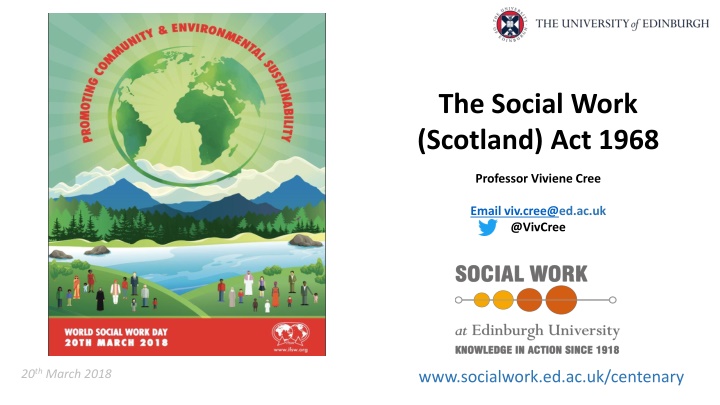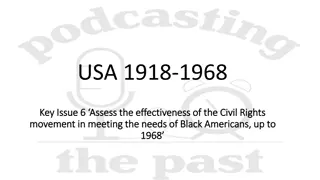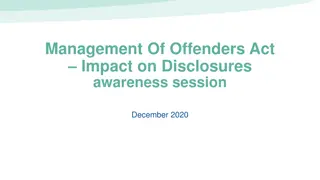Social Work Scotland Act 1968 and Its Impact: Reflections on Policy Intentions and Realization
The Social Work (Scotland) Act 1968 aimed to unify social work services and address the needs of vulnerable populations, particularly children. Despite its comprehensive provisions, the Act faced challenges in implementation, highlighting the gap between policy intentions and practical outcomes. This article delves into the significance of the Act, its key provisions, and the diverse perspectives on its effectiveness.
Download Presentation

Please find below an Image/Link to download the presentation.
The content on the website is provided AS IS for your information and personal use only. It may not be sold, licensed, or shared on other websites without obtaining consent from the author.If you encounter any issues during the download, it is possible that the publisher has removed the file from their server.
You are allowed to download the files provided on this website for personal or commercial use, subject to the condition that they are used lawfully. All files are the property of their respective owners.
The content on the website is provided AS IS for your information and personal use only. It may not be sold, licensed, or shared on other websites without obtaining consent from the author.
E N D
Presentation Transcript
The Social Work (Scotland) Act 1968 Professor Viviene Cree Email viv.cree@ed.ac.uk @VivCree 20th March 2018 www.socialwork.ed.ac.uk/centenary
Todays session Today s session An overview of the 1968 Act, its policy intentions, key strengths & impact The opportunities and challenges looking forward But first the 1960s www.socialwork.ed.ac.uk/centenary
The swinging 60s The swinging 60s a time of social change? a time of social change? www.socialwork.ed.ac.uk/centenary
But not everything in the garden was rosy But not everything in the garden was rosy www.socialwork.ed.ac.uk/centenary
Policy intentions Policy intentions To solve the problem of disparate and uneven social work services to simplify & clarify by creating a single door on which anyone might knock to ask for help (1966 p.4) To solve the problem of what to do with children children who offend and children in need because their situations were found to be much the same What made this possible was a shared belief that social work could make a difference: government, professional bodies, social workers & academics came together to take this forward with the community www.socialwork.ed.ac.uk/centenary
The Act itself The Act itself main provisions main provisions A universal, comprehensive SOCIAL WORK service, managed by Directors of Social Work A reformed system of juvenile justice children s panels Section 12: duty on local authorities (LAs) to promote social welfare The Act provided much of the framework for the activities of LA social workers, and set down specific duties and procedures to be followed in particular circumstances. More than 50% of the Act set down processes relating to children & families & children s panels but section 12 applied to all citizens, including older people, those with disabilities and mental health problems www.socialwork.ed.ac.uk/centenary
So what happened?? So what happened?? The Act was one thing, its realisation another (Murphy 1992 p. 182) www.socialwork.ed.ac.uk/centenary
Immediate challenges Immediate challenges Even before the Act came into force in 1971, the working party s report stated that it represents an aspiration and a target, rather than an immediate increase in resources (1969 p.3) Shortage of trained and experienced staff in 1968, there were less than 1000 workers in LAs in Scotland, of whom only 292 were qualified (& 180 of these were probation officers who d done a year s course)! Key ideas in the 1964 Kilbrandon Report (social treatment & social education) & 1966 White Paper (community work) were either dropped or downplayed in the Act But some gains too e.g. in 1970, 7 of 8 professional associations came together to form BASW; 1973 CCETSW opened a Scottish office; in 1975, the 1973 Local Government Act was enacted www.socialwork.ed.ac.uk/centenary
And since then? The 1980s And since then? The 1980s 1979 Arrival of Thatcher government with a very different mandate 1984 miners strike, Strathclyde Region gave money to striking miners families under Section 12 1988 Griffiths Report promoted mixed economy of care through splitting purchaser/provider roles 1989 Paper 30 CQSW Police hold back pickets at Bilston Glen colliery (Daily Record) www.socialwork.ed.ac.uk/centenary
And 1990s onwards And 1990s onwards Orkney 1991 New Labour, modernising & managerialism, mid 1990s Local government reorganisation 1996 Devolution for Scotland 1998 social work, health & housing is devolved; social security remains in UK SSSC created 2001; new requirements for degree in SW 2002, registration & regulation of the workforce 2003 Review of sw in 2004, published in 2006 as Changing Lives reaffirmed sw as generic profession, setting out reserved functions of a social worker World financial crisis 2007-8; austerity measures hit public spending 2008 onwards Christie Commission 2011 Scottish referendum on independence 2014 www.socialwork.ed.ac.uk/centenary
Two very different world views emerge Two very different world views emerge Optimistic about social progress, idealistic about change Collectivist Social welfare Parental rights Paternalistic Public services, state is best to provide; rest will be superseded Equal access Universal services for all Generic Community development Pessimistic, realistic; nothing works mentality; poverty is always with us Individualist Social justice Parental responsibilities, children s rights Personalised, person-centred Roll back the state, reduce costs, mixed economy of care Individual choice Targeted provision for the most needy Specialist Autonomous citizens VS www.socialwork.ed.ac.uk/centenary
And so whats the long And so what s the long- -term impact been?? term impact been?? There s not a lot left of the SW(S) Act today! And yet, some continuities Scottish solutions still to the fore Partnership still between policy, practice & academic communities, and now also service users LAs still promoting social welfare Public is largely supportive of social work Still working on social work s identity & confidence What can we do to keep the 1960s aspirations alive to be a unified profession that plays a major role in renewing communities and transforming society?? Over to you! www.socialwork.ed.ac.uk/centenary
Key resources Key resources Timeline on www.socialwork.ed.ac.uk/centenary BASW Scottish Committee (1988) The Promotion of Social Welfare. A promise fulfilled?, Rostrum Supplement, Edinburgh: BASW. Brodie, I. Nottingham, C. and Plunkett, S. (2008) A tale of two reports: Social work in Scotland from Social Work and the Community (1996) to Changing Lives (2006) British Journal of Social Work, 38: 697-715. Cree, V.E. and Smith, M. (eds) (2018) Social Work in a Changing Scotland, London: Routledge. Guthrie, T. (2011) Social Work Law in Scotland, Third edition, London: Bloomsbury Professional. Murphy, J. (1992) British Social Services. The Scottish Dimension, Edinburgh: Scottish Academic Press. SHHD/SED Kilbrandon Report (1964) Children and Young Persons Scotland, Report of Interdepartmental Committee, Cmnd. 2306. SED/SHHD (1966) Social Work and the Community White Paper, Cmnd.3065.























